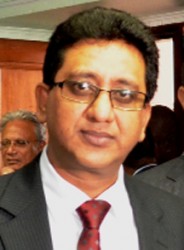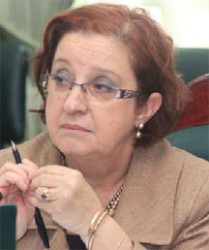The much contested Anti-Money Laundering and Countering the Financing of Terrorism (AML/CFT) (Amendment) Bill will return as Bill No. 4 to the 11th parliament today and while its passage is guaranteed with the APNU+AFC government in control of the legislature, the now opposition PPP/C has blasted it for being non-compliant with international requirements.
Former Attorney General and PPP Executive Anil Nandlall stated at a PPP press conference yesterday at Freedom House that with the proposed amendments to the PPP/C’s 2013 version, the bill is prone to “contamination” by Politically Exposed Persons (PEP).
Nandlall said that the APNU+AFC amendments to the 2013 bill seeking to have the Director and staff of the Financial Intelligence Unit (FIU) appointed by politicians in the National Assembly went against the warning about PEPs by the global watchdog group, the Financial Action task Force (FATF).

Nandlall argued that “what they have done in this bill is to take politically exposed persons who are MPs and make them the appointing authority for the FIU. This (FATF) document basically tells you to insulate them from the investigative and monitoring arm of AML/CFT infrastructure and bodies that are there to investigate.”
Responding to Nandlall, Minister of State Joe Harmon yesterday stated in his post-cabinet briefing that “I really don’t know what it is that the former Attorney General Anil Nandlall is talking about because why would we put something in there for cheap political value. This is law we are talking about. This is not some joke. It is not a promise to do something, this is the law we are talking about.”
Expressing confidence in the amended bill, Harmon stated “There were large enough holes (in the PPP/C’s version) that a shark can swim through. That is what we were doing in the select committee in the 10th parliament and this is what we are going to bring to the National Assembly, a tightened law that will make sure that we satisfy our international obligations and send a very clear message to money launderers that their time is up.”
The bill that will be tabled in parliament today is the version that the then opposition APNU and AFC were attempting to have the PPP/C government approve in the 10th Parliament to no avail. The two parties have been locked in debate about the reforms for around three years now without a deal.

Nandlall, who had attended several international meetings on the anti-money laundering law, said that the FATF had prepared a manual specifically pronouncing on what a PEP was and how the AML/CFT legislation needed to be insulated from influence. Reading from the manual yesterday, Nandlall defined a PEP as “an individual who is or has been entrusted with the prominent public function. Due to their position and influence it is recognized that many PEPs are in a position that can potentially be abused for the purposes of committing money laundering offences and related predicated offences relating to corruption and bribery as well as conducting activities related to terrorist financing. This has been confirmed by analysis and case studies. The potential risks associated with PEPs justify application of additional anti-money laundering, countering the financing of terrorism preventative measures with respect to business relationships with PEPs. To address these risks, FATF recommendations 12 and 22 require countries to ensure that financial institutions and designated non-financial business and professions implement measure to prevent the misuse of financial systems and non-financial business and professions by PEPs and to detect such potential abuse when it occurs.”
Nandlall added that PEPs are to be treated in a very specific manner to ensure that the FIU remains autonomous and able to investigate PEPs who have shown a susceptibility to money laundering efforts.
Political bias
Stabroek News inquired as to whether or not the PPP would lobby for the FIU’s autonomy given that appointments fall within the purview of the Parliament. He said that “in this (APNU+AFC) case the FIU is operating under a regulatory body, under the dictate of a regulatory body that are appointed by politicians and that is where the infection of bias will come not only in the appointment process, but the atmosphere in which it has to function.”
Nandlall emphasised that the FIU will be charged with operating while “infected with political bias,” from the Director, Assistant Director, Accountant and Lawyer among others, “so at every level of the FIU structure it operates in a contaminated environment not acceptable to international standards”.
“This bill takes politically exposed persons and makes them managers basically of the FIU because this bill allows Parliament to appoint 10 persons and then another 9 are ex officio members and they form what is called and AML/CFT authority and they basically manage the FIU and it is the Parliament that appoint the FIU Director and Assistant Director,” he told members of the media.
When asked if the extant structure of the Director’s appointment through the Presidency was also cause for concern, Nandall said that while Presidential appointment was a generally accepted way of doing such things the process prior to the appointment allows for independence without bias. He stated “in our bill the only political action is the (appointment) of the FIU director by the president and the truth is it is better you have contamination coming from one person than contamination coming from 65”, alluding to the number of MPs in the National Assembly.
PPP Executive and former Chief Whip, Gail Teixeira, said that the proposed APNU+AFC amendments to the 2009 Act were “offensive” considering that “at no time did the FATF cite the manner of the FIU Director’s appointment…it wasn’t flagged as being in violation. This is where the whims and fancies of the APNU/AFC come to light.”
Teixeira balked at questions relating to the PPP/C not being in Parliament to address their concerns during the reading of the bill for the first time. She said
simply that the PPP’s positon is well known, “there is nothing new to say we have said it all and we will continue to say it.”
She highlighted the long nights that the Parliament Committee laboured over the amendment bill noting that many members of the media would camp outside of the National Assembly awaiting answers as to any breakthroughs or compromise between the then PPP/C- led government and the now coalesced APNU+AFC.
In a statement read at the press conference, Teixeira lambasted amendments planned to the 2013 PPP/C bill by the APNU and AFC stating that the first amendment which proposed removing the Attorney General’s role and replacing it with that of the FIU Director was problematic.
She noted the FATF’s position on this matter. “Countries should consider whether the Director of the FIU given his main function is the appropriate official with respect to resources and qualifications to ensure that entities are listed, evidence presented to judges in connection with listing and orders by judges in relation to listing are reviewed. This function is closely linked to the application for court orders to seize and freeze criminal proceeds of the listed entities, a function that is carried out usually by the Attorney General in his/her role as legal advisor to the Government to fulfil a country’s international legal obligations.”
She noted that the primary function of the FIU has always been to receive, analyse and disseminate information.
Additionally Teixeira criticised APNU+AFC’s third amendment which applies to Section 37 of the act and would extend the rights of police officers and custom officials to seize cash of $10M and over. She noted that this along with the Parliamentary power to appoint and dismiss FIU staff was also not a FATF requirement. “It is noted that no deficiency with respect to this obligation was noted in Guyana’s Mutual Evaluation Report for the Third Round…… Similar provisions are in place in Trinidad and Tobago, Grenada and St. Vincent and the Grenadines with safeguards which include limiting the initial period of seizure to hours and requiring judicial approval for any extension of the period,” Teixeira noted.
Guyana has been lobbying to gain full international compliance and has missed these opportunities since 2013 having failed to conform to the FATF’s requirement of passing the necessary legislation.
FATF in July 2014 informed the government that it would be executing a targeted review of Guyana’s AML/CFT infrastructure. The review, the FATF said, would be conducted by the Americas Regional Review Group of the International Cooperation Review Group. Again in October 2014, Guyana was able to avoid blacklisting by the FATF after a review by the FATF’s International Co-operation Review Group, in Paris.




